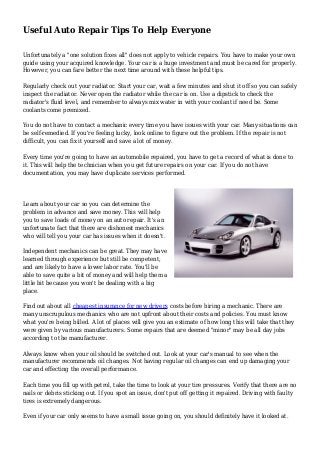
Useful Auto Repair Tips To Help Everyone
- 1. Useful Auto Repair Tips To Help Everyone Unfortunately a "one solution fixes all" does not apply to vehicle repairs. You have to make your own guide using your acquired knowledge. Your car is a huge investment and must be cared for properly. However, you can fare better the next time around with these helpful tips. Regularly check out your radiator. Start your car, wait a few minutes and shut it off so you can safely inspect the radiator. Never open the radiator while the car is on. Use a dipstick to check the radiator's fluid level, and remember to always mix water in with your coolant if need be. Some coolants come premixed. You do not have to contact a mechanic every time you have issues with your car. Many situations can be self-remedied. If you're feeling lucky, look online to figure out the problem. If the repair is not difficult, you can fix it yourself and save a lot of money. Every time you're going to have an automobile repaired, you have to get a record of what is done to it. This will help the technician when you get future repairs on your car. If you do not have documentation, you may have duplicate services performed. Learn about your car so you can determine the problem in advance and save money. This will help you to save loads of money on an auto repair. It's an unfortunate fact that there are dishonest mechanics who will tell you your car has issues when it doesn't. Independent mechanics can be great. They may have learned through experience but still be competent, and are likely to have a lower labor rate. You'll be able to save quite a bit of money and will help them a little bit because you won't be dealing with a big place. Find out about all cheapest insurance for new drivers costs before hiring a mechanic. There are many unscrupulous mechanics who are not upfront about their costs and policies. You must know what you're being billed. A lot of places will give you an estimate of how long this will take that they were given by various manufacturers. Some repairs that are deemed "minor" may be all day jobs according to the manufacturer. Always know when your oil should be switched out. Look at your car's manual to see when the manufacturer recommends oil changes. Not having regular oil changes can end up damaging your car and effecting the overall performance. Each time you fill up with petrol, take the time to look at your tire pressures. Verify that there are no nails or debris sticking out. If you spot an issue, don't put off getting it repaired. Driving with faulty tires is extremely dangerous. Even if your car only seems to have a small issue going on, you should definitely have it looked at.
- 2. Sometimes when there are small issues with your vehicle, ignoring them will only lead to the problem becoming much larger as time goes on. Do not allow anyone to sell you any auto parts that they claim will last a lifetime. A lot of the time they just say this so that they're able to make more off of you. A common example is a car that has "lifetime" transmission fluid. This shouldn't have to be changed quite as often as standard fluid, but it should be changed every 80,000 miles. Many people don't actually read their car manual. You need to learn the manual so that you can find information right away. Your manual tells you all that you should know about how you can maintain your car yourself. Bleed brakes after you've worked on them and before test driving them. Then pump the brake pedal to distribute brake fluid. Examine closely to see if any leaking has occurred. You don't want to run low on your brake fluid. You are then ready to test drive your car on roads that don't have a lot of traffic. Go slow to make sure the repair is holding before you speed up. Now you have more of a chance to have a great experience when you're getting a vehicle repaired. You never want to hear the news that repairs are necessary, but you can handle the situation well by following the tips included in this article. The next time your vehicle needs repairs, you're good to go.